英语笔记
- 格式:docx
- 大小:64.23 KB
- 文档页数:16
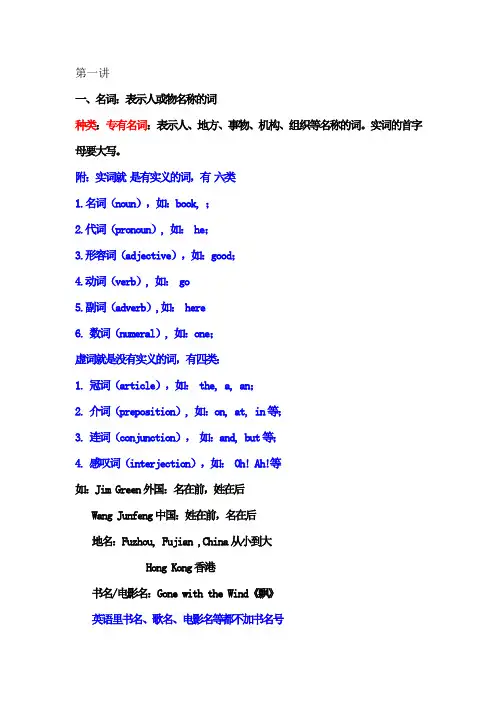
第一讲一、名词:表示人或物名称的词种类:专有名词:表示人、地方、事物、机构、组织等名称的词。
实词的首字母要大写。
附:实词就是有实义的词,有六类1.名词(noun),如:book, ;2.代词(pronoun), 如:he;3.形容词(adjective),如:good;4.动词(verb), 如:go5.副词(adverb),如:here6. 数词(numeral), 如:one;虚词就是没有实义的词,有四类:1. 冠词(article),如:the, a, an;2. 介词(preposition), 如:on, at, in等;3. 连词(conjunction),如:and, but等;4. 感叹词(interjection),如:Oh! Ah!等如:Jim Green外国:名在前,姓在后Wang Junfeng中国:姓在前,名在后地名:Fuzhou, Fujian ,China从小到大Hong Kong香港书名/电影名:Gone with the Wind《飘》英语里书名、歌名、电影名等都不加书名号the Greens格林一家英语里在姓的复数前面加the,表示一家人或夫妇俩。
普通名词:可数名词(个体名词、集体名词)不可数名词①可数名词单数变复数变化规则:一般词尾加s;s,x,sh,ch结尾的加es;辅音字母+y,去y改为ies;f/ fe结尾,改为ves;四个以o结尾的加es:黑人英雄喜欢吃土豆和西红柿(Negro, hero, potato, tomato)②某国人变复数:中日不变英法变,其余s加后面③可数名词单数变复数不规则变化常见的有:foot脚—feet; goose鹅—geesetooth 牙齿—teeth; man 男人—menwoman 妇女—womenmouse 老鼠—micechild 孩子—children;ox牛—oxen长着老鼠牙的女人和长着鹅脚的男人生的孩子,真牛.二、代词物主代词用来表示某人或某物属于"谁的"的代词叫做物主代词名词所有格名词所有格,表物是“谁的”,若为生命词,加“’s”即可行,词尾有s,仅把逗号择;并列名词后,各自和共有,前者分别加,后者最后加;若为无生命词,of所有格,前后须倒置,此是硬规则。
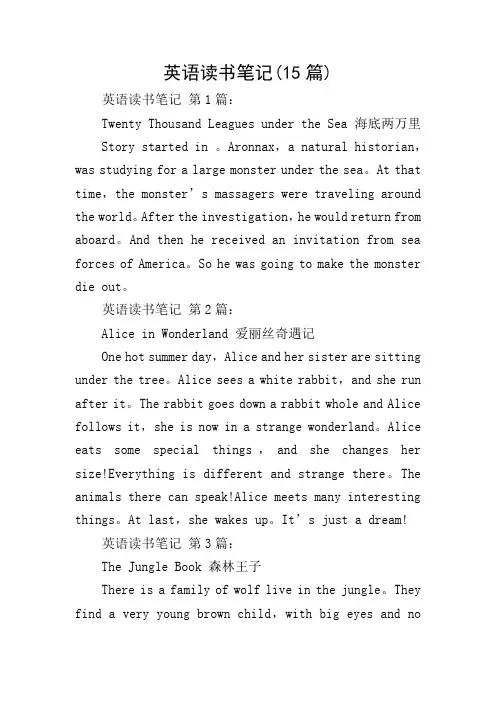
英语读书笔记(15篇)英语读书笔记第1篇:Twenty Thousand Leagues under the Sea 海底两万里 Story started in 。
Aronnax,a natural historian,was studying for a large monster under the sea。
At that time,the monster’s massagers were traveling around the world。
After the investigation,he would return from aboard。
And then he received an invitation from sea forces of America。
So he was going to make the monster die out。
英语读书笔记第2篇:Alice in Wonderland 爱丽丝奇遇记One hot summer day,Alice and her sister are sitting under the tree。
Alice sees a white rabbit,and she run after it。
The rabbit goes down a rabbit whole and Alice follows it,she is now in a strange wonderland。
Alice eats some special things,and she changes her size!Everything is different and strange there。
The animals there can speak!Alice meets many interesting things。
At last,she wakes up。
It’s just a dream!英语读书笔记第3篇:The Jungle Book 森林王子There is a family of wolf live in the jungle。
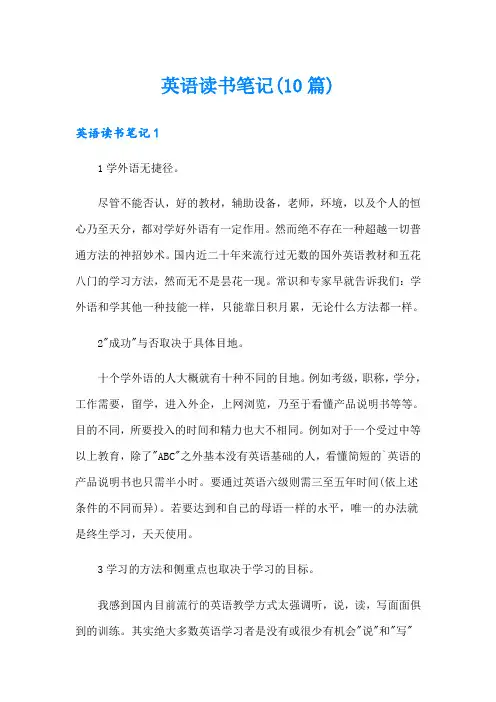
英语读书笔记(10篇)英语读书笔记11学外语无捷径。
尽管不能否认,好的教材,辅助设备,老师,环境,以及个人的恒心乃至天分,都对学好外语有一定作用。
然而绝不存在一种超越一切普通方法的神招妙术。
国内近二十年来流行过无数的国外英语教材和五花八门的学习方法,然而无不是昙花一现。
常识和专家早就告诉我们:学外语和学其他一种技能一样,只能靠日积月累,无论什么方法都一样。
2"成功"与否取决于具体目地。
十个学外语的人大概就有十种不同的目地。
例如考级,职称,学分,工作需要,留学,进入外企,上网浏览,乃至于看懂产品说明书等等。
目的不同,所要投入的时间和精力也大不相同。
例如对于一个受过中等以上教育,除了"ABC"之外基本没有英语基础的人,看懂简短的`英语的产品说明书也只需半小时。
要通过英语六级则需三至五年时间(依上述条件的不同而异)。
若要达到和自己的母语一样的水平,唯一的办法就是终生学习,天天使用。
3学习的方法和侧重点也取决于学习的目标。
我感到国内目前流行的英语教学方式太强调听,说,读,写面面俱到的训练。
其实绝大多数英语学习者是没有或很少有机会"说"和"写"的。
因此这种训练往往是事倍功半。
因为学得再好不用很快就忘记了。
对于绝大多数人来说,"读"是唯一有实际效用,也是唯一能够尽快掌握的技能。
4只要有明确的目标和兴趣,假以时日,任何人都可以学好一门甚至多门外语。
总而言之,从我个人的经历看,学好英语主要是兴趣和目标。
这和做任何事没什么两样。
很多人一开始兴趣浓厚,可渐渐就兴味索然了。
这主要是缺乏明确的目标和动力。
我开始学英语的目标是读懂简写本的英文小说,后来变成读懂英文原著。
后来又希望能听懂英语广播,再后来又想能和外国人自由交谈。
这期间当然还有许多小的阶段性目标。
在每一个目标达到之后,你都会有一种成功的乐趣。
如果漫无目的,或者好高鹜远,就会很快感到没趣或挫折。
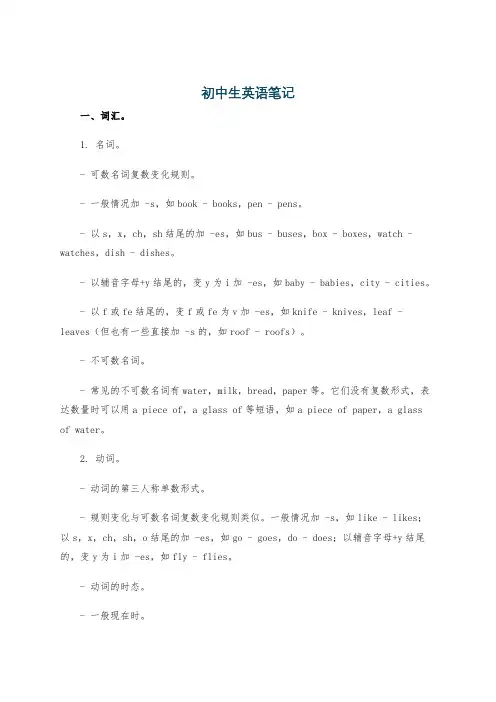
初中生英语笔记一、词汇。
1. 名词。
- 可数名词复数变化规则。
- 一般情况加 -s,如book - books,pen - pens。
- 以s,x,ch,sh结尾的加 -es,如bus - buses,box - boxes,watch - watches,dish - dishes。
- 以辅音字母+y结尾的,变y为i加 -es,如baby - babies,city - cities。
- 以f或fe结尾的,变f或fe为v加 -es,如knife - knives,leaf - leaves(但也有一些直接加 -s的,如roof - roofs)。
- 不可数名词。
- 常见的不可数名词有water,milk,bread,paper等。
它们没有复数形式,表达数量时可以用a piece of,a glass of等短语,如a piece of paper,a glass of water。
2. 动词。
- 动词的第三人称单数形式。
- 规则变化与可数名词复数变化规则类似。
一般情况加 -s,如like - likes;以s,x,ch,sh,o结尾的加 -es,如go - goes,do - does;以辅音字母+y结尾的,变y为i加 -es,如fly - flies。
- 动词的时态。
- 一般现在时。
- 表示经常或习惯性的动作或状态。
结构:主语+动词原形(主语为第三人称单数时,动词用第三人称单数形式)。
例如:I often play football. He often plays football.- 现在进行时。
- 表示正在进行的动作。
结构:be动词(am/is/are)+动词的 -ing形式。
例如:I am reading a book. They are playing games.- 一般过去时。
- 表示过去某个时间发生的动作或存在的状态。
规则动词过去式一般在词尾加 -ed,如play - played,work - worked;不规则动词有特殊的过去式形式,如go - went,have - had。
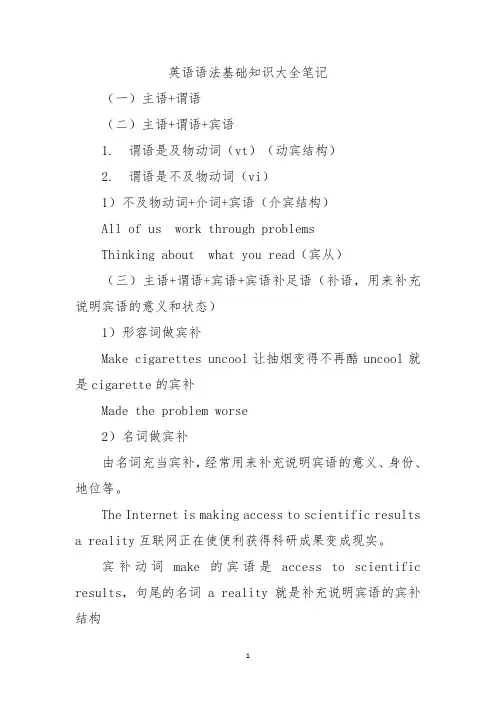
英语语法基础知识大全笔记(一)主语+谓语(二)主语+谓语+宾语1. 谓语是及物动词(vt)(动宾结构)2. 谓语是不及物动词(vi)1)不及物动词+介词+宾语(介宾结构)All of us work through problemsThinking about what you read(宾从)(三)主语+谓语+宾语+宾语补足语(补语,用来补充说明宾语的意义和状态)1)形容词做宾补Make cigarettes uncool让抽烟变得不再酷uncool就是cigarette的宾补Made the problem worse2)名词做宾补由名词充当宾补,经常用来补充说明宾语的意义、身份、地位等。
The Internet is making access to scientific results a reality互联网正在使便利获得科研成果变成现实。
宾补动词make的宾语是access to scientific results,句尾的名词a reality就是补充说明宾语的宾补结构3)动词做宾补以动词原形、不带to的不定式和分词结构为主Make the site seem objective 使网站看起来公正客观宾补动词make后面的宾补为动词seem,这就是我们常说的make+某人/某物+动词原形,表示使某人/某物...He hesitanted make his discovery known将自己的发现公之于众犹豫不决To see a woman driving4)常见的宾补动词A. 宾补常为形容词的动词:make,render,find,drive,get等+adj。
B. 宾补常为形容词的动词:make,appoint,elect,crown等+n5)宾语后置当宾语是一个较为复杂的动词不定式结构或者是一个从句时,为了保持句子平衡,习惯上会将宾语后置,会用it 来冲当形式宾语。
The financial crisis has made it more acceptable to be between jobs or to leave a bad one 金融危机使得工作还是辞退不好的工作变得更容易接受谓语是make,宾语为to be between jobs or to leave a bad one,但由于宾语较长后面还加上more acceptable 的宾补,考虑到句子平衡所以后置了宾语。
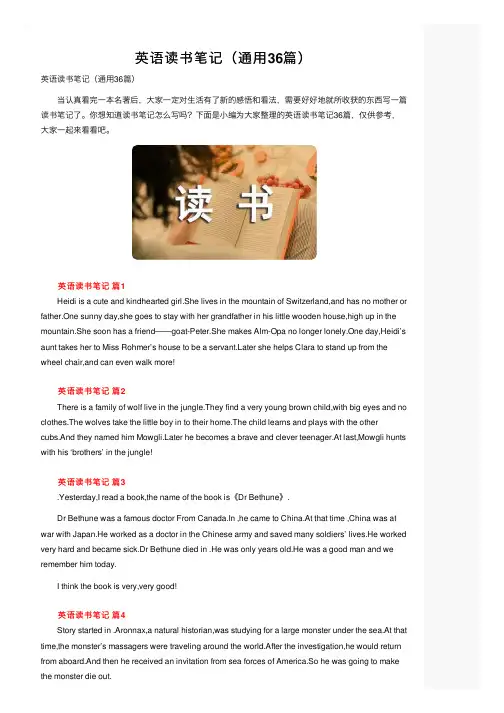
英语读书笔记(通⽤36篇)英语读书笔记(通⽤36篇) 当认真看完⼀本名著后,⼤家⼀定对⽣活有了新的感悟和看法,需要好好地就所收获的东西写⼀篇读书笔记了。
你想知道读书笔记怎么写吗?下⾯是⼩编为⼤家整理的英语读书笔记36篇,仅供参考,⼤家⼀起来看看吧。
英语读书笔记篇1 Heidi is a cute and kindhearted girl.She lives in the mountain of Switzerland,and has no mother or father.One sunny day,she goes to stay with her grandfather in his little wooden house,high up in the mountain.She soon has a friend——goat-Peter.She makes Alm-Opa no longer lonely.One day,Heidi’s aunt takes her to Miss Rohmer’s house to be a ter she helps Clara to stand up from the wheel chair,and can even walk more! 英语读书笔记篇2 There is a family of wolf live in the jungle.They find a very young brown child,with big eyes and no clothes.The wolves take the little boy in to their home.The child learns and plays with the other cubs.And they named him ter he becomes a brave and clever teenager.At last,Mowgli hunts with his ‘brothers’ in the jungle! 英语读书笔记篇3 .Yesterday,I read a book,the name of the book is《Dr Bethune》. Dr Bethune was a famous doctor From Canada.In ,he came to China.At that time ,China was at war with Japan.He worked as a doctor in the Chinese army and saved many soldiers’ lives.He worked very hard and became sick.Dr Bethune died in .He was only years old.He was a good man and we remember him today. I think the book is very,very good! 英语读书笔记篇4 Story started in .Aronnax,a natural historian,was studying for a large monster under the sea.At that time,the monster’s massagers were traveling around the world.After the investigation,he would return from aboard.And then he received an invitation from sea forces of America.So he was going to make the monster die out. 英语读书笔记篇5 Peter and Susan arrived at their hotel in Lea-on-Sea.They always visit a beautiful island every year.But this time,they meet a man who pretends to be Peter.He has the same face as Peter by his mask.He is Stephen Griggs.He killed Susan and takes out his mask,and then gives Peter the gun!In this way,peter was caught by the police. 英语读书笔记篇6 Nick is a good surfer.He wants to go to Australia for three months.But his parents don’t like his plan.They want Nick to go to college.But Nick still tries his best to make his parents agree.Because he wants to join an important surfing competition ter Nick join another surfing competition,and he win the first price——a thousand pounds!Then his father agrees with Nick’s plan,and affords his plane ticket! 英语读书笔记篇7 One hot summer day,Alice and her sister are sitting under the tree.Alice sees a white rabbit,and she run after it.The rabbit goes down a rabbit whole and Alice follows it,she is now in a strange wonderland.Alice eats some special things,and she changes her size!Everything is different and strange there.The animals there can speak!Alice meets many interesting things.At last,she wakes up.It’s just a dream! 英语读书笔记篇8 This book tells five famous fairy tales.Today,I will mainly introduce the story,The WhiteBirds,written by Hans Anderson. There is a king with ten sons and one daughter.Their mother died when the daughter,Elisa,was born.Then the king married with another woman.But she is a bad and jealous woman.She changes the boys in to ten white birds.Elisa makes the coats of gold flowers to help them.Finally she succeeds,her brothers change bake to people,and she married with a king. 英语读书笔记篇9 The story includes three parts.They are respectively talking about:Gulliver in Lilliput,in Brobdingnag,and in Houyhnms. Gulliver travels to the South Seas.On their way to the East Indies,a strong wind carried them to the wrong way.Most of the people died.Some days later,he comes to Lilliput,everything is small there.Three days later,he comes to Brobdingnag.This country is opposite from Lilliput,the thing are huge,very huge!Then he travels to a place called Houyhnms,which is also very interesting. 英语读书笔记篇10 The Old Man and the Sea is one of Hemingway's most enduring works.Told in language of great simplicity and power,it is the story of an old Cuban fisherman,down on his luck,and his supreme ordeal——a relentless,agonizing battle with a giant marlin far out in the Gulf Stream. Here Hemingway recasts,in strikingly contemporary style,the classic thene of courage in the face of defeat,of personal triumph won from los. Written in 1952,this hugely successfully novella confirmed his power and presence in the literary world and played a huge part in his winning the 1954 Nobel Prize for Literature. The novel is very famous in the world, so lot of people like this novel. We also studied it in our Chinese class, Hemingway's novel are always interesting I like his novel much, also in his novel we can learn a lot by his meanings. It’s really a good novel for people to read. 英语读书笔记篇11 After reading the biography of Madame Curie, it was clear that Marie Curie had been humiliated and expected in her youth. Mary always stood by her belief that she could not let anyone or anything down with her. No matter meet anyone or anything to a firm conviction, and these have to be fostered, no matter in her life were killed, or in her study, can put these play out. And in the course of her schooling, it was hard. No matter how difficult in the process of road walk, Mary insisted down, these all let me understand start to cultivate good character and character, not bow in front of tribulations, don't be afraid to go to deal with it, to overcome it. These trials will also help you succeed. 英语读书笔记篇12 Recently, I read a fairy story book, Little Prince.This book tells the adventurous experiences of little prince from his planet to the earth.Little prince comes from the outer space and he is hurt by a rose. So he leaves there and travels into space.He comes to the earth and be the friend of a fox.The fox tells his secret to little prince and he helps a pilot in the desert. In the end, he dies under the help of a snake and his soul goes back to his planet.This book is very interesting and teaches me a lot. I like little price adventures.He teaches me to be honest and love others.All of us should never loss the pureness of childhood. 英语读书笔记篇13 One day, Charley bought a hot dog in a snack bar after school. Suddenly, he stopped and raised his head high. He kept looking at the sky. It lasted two minutes. A woman passed by. She saw Charley looking at the sky and she stopped and also looked at the sky. The sky was blue. There were some white clouds. Charley still looked at the sky and didn’t move a bit. The woman also went on looking at the sky. Mary passers-by stopped. They looked at the sky, too. After a while, charley lowered his head. He laughed and asked. “What are you looking for in the sky?” The woman said: “why are you looking at the sky?” “I didn’t look at the sky.” Charley pointed to his nose, “My nose was bleeding.” 英语读书笔记篇14 There is a farmer named Rip Van Winkle. He doesn’t like working at all, but he likes to talk. One day, Rip goes to the mountains with his dog, Wolf. They meet an old man. He is strange, he has a big barrel on his back. He never talks! They walk and walk up the mountain. They come to a building, there, Rip meets a lot of strange man. Rip and the old man had a lot of drinks in the barrel. Then Rip fall in to sleep. He sleeps for 20 years! Rip wakes up and goes home. He meets his daughter and knows that many people died in the war between America and Britain. Later, ,rip tells his strange story to his new friends in his new town——The United States of America. 英语读书笔记篇15 I was so touched by the book "charlotte's web", and several times I dropped tears of emotion. The book is about a pig Wilbur who was about to become a delicacy. In the barn he knew the spider charlotte, who had not slept for two days and two nights in order to rescue it, because it had to "write" the words on the Internet. Then Wilbur was saved and famous. Charlotte was dead tired! In the second spring, Wilbur remembered charlotte, a spider who had helped him before. You must shed tears when it comes to this! I believe this story must make you deeply moved! Yeah! The story of spider charlotte and Wilbur, the pig, makes millions of people cry. 英语读书笔记篇16 Hello,everyone.I am so glad to stand here.First of all,I will introduce myself.My name is...,I am...years old this year.I have many hobbies,such as:reading.dancing.writing and so on.Also I like English very much.I think English is very useful for us,because many many people in the world can speak English,if I learn it well,I can talk with them and make friends with them.Besides these,I also like doing some exercises.Doing exercises can make us healthier.Health is so important for us,we can not doing anything without a good health. So,we can do exercises togher in the future.I also like help others,when you are in trouble,I will do anything that I can.Of course,I hope you my classmates can help me too.At the last,I wish we can become good friends and everybody can get a good result at the end ! 英语读书笔记篇17 《命运》讲的是连个孩⼦的命运,⼀个被⾼僧占⼘为状元,另⼀个为乞丐。
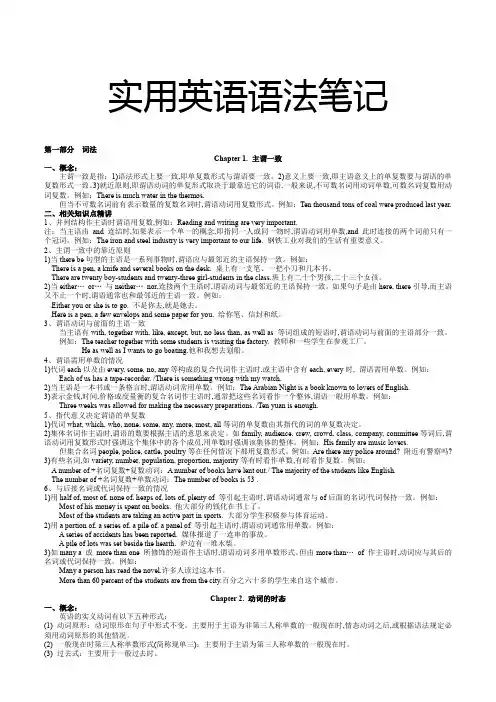
实用英语语法笔记第一部分词法Chapter 1. 主谓一致一、概念:主谓一致是指:1)语法形式上要一致,即单复数形式与谓语要一致。
2)意义上要一致,即主语意义上的单复数要与谓语的单复数形式一致。
3)就近原则,即谓语动词的单复形式取决于最靠近它的词语,一般来说,不可数名词用动词单数,可数名词复数用动词复数。
例如:There is much water in the thermos.但当不可数名词前有表示数量的复数名词时,谓语动词用复数形式。
例如:Ten thousand tons of coal were produced last year.二、相关知识点精讲1、并列结构作主语时谓语用复数,例如:Reading and writing are very important.注:当主语由and连结时,如果表示一个单一的概念,即指同一人或同一物时,谓语动词用单数,and 此时连接的两个词前只有一个冠词。
例如:The iron and steel industry is very important to our life. 钢铁工业对我们的生活有重要意义。
2、主谓一致中的靠近原则1)当there be句型的主语是一系列事物时,谓语应与最邻近的主语保持一致。
例如:There is a pen, a knife and several books on the desk. 桌上有一支笔、一把小刀和几本书。
There are twenty boy-students and twenty-three girl-students in the class.班上有二十个男孩,二十三个女孩。
2)当either…or…与neither…nor,连接两个主语时,谓语动词与最邻近的主语保持一致。
如果句子是由here, there引导,而主语又不止一个时,谓语通常也和最邻近的主语一致。
例如:Either you or she is to go. 不是你去,就是她去。
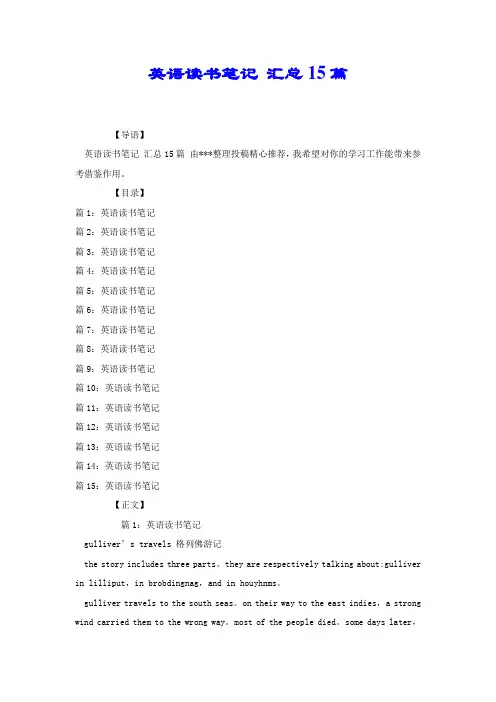
英语读书笔记汇总15篇【导语】英语读书笔记汇总15篇由***整理投稿精心推荐,我希望对你的学习工作能带来参考借鉴作用。
【目录】篇1:英语读书笔记篇2:英语读书笔记篇3:英语读书笔记篇4:英语读书笔记篇5:英语读书笔记篇6:英语读书笔记篇7:英语读书笔记篇8:英语读书笔记篇9:英语读书笔记篇10:英语读书笔记篇11:英语读书笔记篇12:英语读书笔记篇13:英语读书笔记篇14:英语读书笔记篇15:英语读书笔记【正文】篇1:英语读书笔记gulliver’s travels 格列佛游记the story includes three parts。
they are respectively talking about:gulliver in lilliput,in brobdingnag,and in houyhnms。
gulliver travels to the south seas。
on their way to the east indies,a strong wind carried them to the wrong way。
most of the people died。
some days later,he es to lilliput,everything is small there。
three days later,he es to brobdingnag。
this country is opposite from lilliput,the thing are huge,very huge!then he travels to a place called houyhnms,which is also very interesting。
篇2:英语读书笔记five famous fairy tales 著名童话五则this book tells five famous fairy tales。
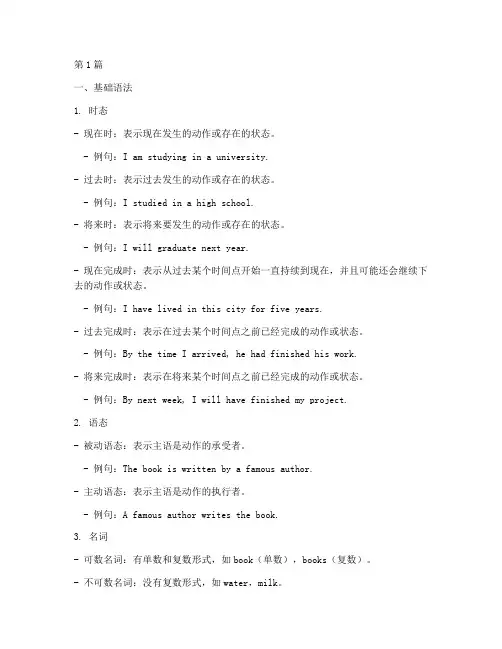
第1篇一、基础语法1. 时态- 现在时:表示现在发生的动作或存在的状态。
- 例句:I am studying in a university.- 过去时:表示过去发生的动作或存在的状态。
- 例句:I studied in a high school.- 将来时:表示将来要发生的动作或存在的状态。
- 例句:I will graduate next year.- 现在完成时:表示从过去某个时间点开始一直持续到现在,并且可能还会继续下去的动作或状态。
- 例句:I have lived in this city for five years.- 过去完成时:表示在过去某个时间点之前已经完成的动作或状态。
- 例句:By the time I arrived, he had finished his work.- 将来完成时:表示在将来某个时间点之前已经完成的动作或状态。
- 例句:By next week, I will have finished my project.2. 语态- 被动语态:表示主语是动作的承受者。
- 例句:The book is written by a famous author.- 主动语态:表示主语是动作的执行者。
- 例句:A famous author writes the book.3. 名词- 可数名词:有单数和复数形式,如book(单数),books(复数)。
- 不可数名词:没有复数形式,如water,milk。
- 名词所有格:表示所属关系,如the teacher's book,my friend's car。
4. 代词- 人称代词:I(我),you(你),he(他),she(她),it(它),we(我们),they(他们)。
- 物主代词:my(我的),your(你的),his(他的),her(她的),its(它的),our(我们的),their(他们的)。
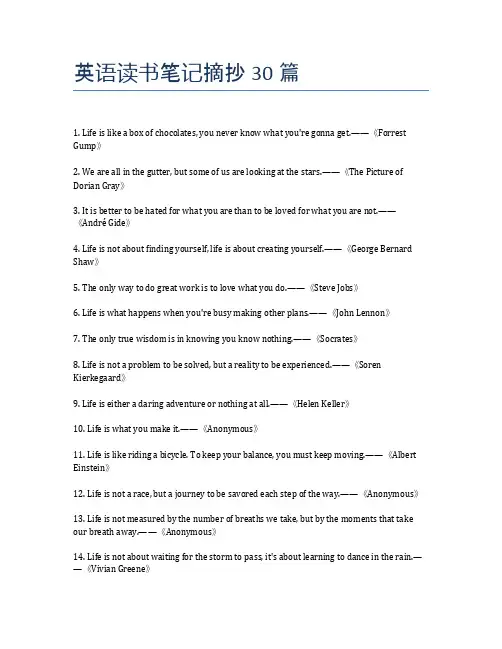
英语读书笔记摘抄30篇1. Life is like a box of chocolates, you never know what you're gonna get.——《Forrest Gump》2. We are all in the gutter, but some of us are looking at the stars.——《The Picture of Dorian Gray》3. It is better to be hated for what you are than to be loved for what you are not.——《André Gide》4. Life is not about finding yourself, life is about creating yourself.——《George Bernard Shaw》5. The only way to do great work is to love what you do.——《Steve Jobs》6. Life is what happens when you're busy making other plans.——《John Lennon》7. The only true wisdom is in knowing you know nothing.——《Socrates》8. Life is not a problem to be solved, but a reality to be experienced.——《Soren Kierkegaard》9. Life is either a daring adventure or nothing at all.——《Helen Keller》10. Life is what you make it.——《Anonymous》11. Life is like riding a bicycle. To keep your balance, you must keep moving.——《Albert Einstein》12. Life is not a race, but a journey to be savored each step of the way.——《Anonymous》13. Life is not measured by the number of breaths we take, but by the moments that take our breath away.——《Anonymous》14. Life is not about waiting for the storm to pass, it's about learning to dance in the rain.——《Vivian Greene》15. Life is not a problem to be solved, but a mystery to be lived.——《Anonymous》16. Life is like a book, some chapters are sad, some are happy and some are exciting, but if you never turn the page, you will never know what the next chapter holds.——《Anonymous》17. Life is not about how fast you run or how high you climb, but how well you bounce.——《Vivian Komori》18. Life is not a matter of milestones, but of moments.——《Rose Kennedy》19. Life is not about finding yourself, it's about creating yourself.——《George Bernard Shaw》20. Life is not a journey to the grave with the intention of arriving safely in a pretty and well-preserved body, but rather to skid in broadside, thoroughly used up, totally worn out, and loudly proclaiming, "Wow, what a ride!"——《Hunter S. Thompson》21. Life is not a problem to be solved, but a gift to be enjoyed.——《Anonymous》22. Life is not a destination, it's a journey.——《Anonymous》23. Life is not a race, but a journey to be savored each step of the way.——《Anonymous》24. Life is not about waiting for the storm to pass, it's about learning to dance in the rain.——《Vivian Greene》25. Life is not a rehearsal, it's the real thing.——《Anonymous》26. Life is not a spectator sport. If you're going to spend your whole life in the grandstand just watching what goes on, in my opinion you're wasting your life.——《Jackie Robinson》27. Life is not a bed of roses.——《Anonymous》28. Life is not a problem to be solved, but a reality to be experienced.——《Soren Kierkegaard》29. Life is not a straight line, it's a winding road.——《Anonymous》30. Life is not about how fast you run or how high you climb, but how well you bounce.——《Vivian Komori》人生就像一盒巧克力,你永远不知道会得到什么。
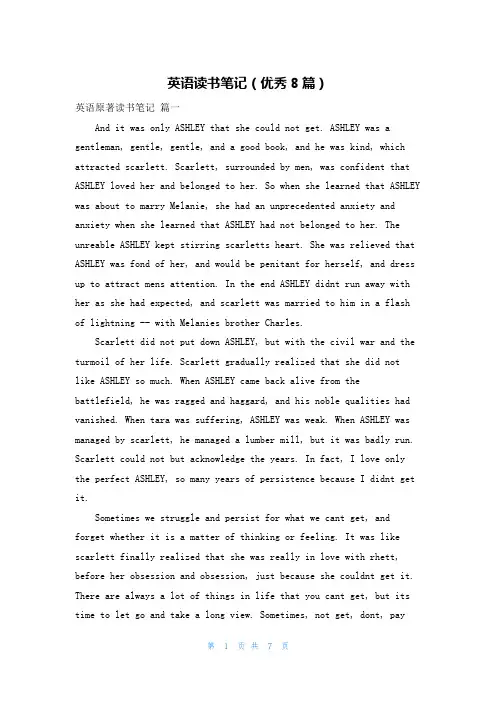
英语读书笔记(优秀8篇)英语原著读书笔记篇一And it was only ASHLEY that she could not get. ASHLEY was a gentleman, gentle, gentle, and a good book, and he was kind, which attracted scarlett. Scarlett, surrounded by men, was confident that ASHLEY loved her and belonged to her. So when she learned that ASHLEY was about to marry Melanie, she had an unprecedented anxiety and anxiety when she learned that ASHLEY had not belonged to her. The unreable ASHLEY kept stirring scarletts heart. She was relieved that ASHLEY was fond of her, and would be penitant for herself, and dress up to attract mens attention. In the end ASHLEY didnt run away with her as she had expected, and scarlett was married to him in a flash of lightning -- with Melanies brother Charles.Scarlett did not put down ASHLEY, but with the civil war and the turmoil of her life. Scarlett gradually realized that she did notlike ASHLEY so much. When ASHLEY came back alive from thebattlefield, he was ragged and haggard, and his noble qualities had vanished. When tara was suffering, ASHLEY was weak. When ASHLEY was managed by scarlett, he managed a lumber mill, but it was badly run. Scarlett could not but acknowledge the years. In fact, I love only the perfect ASHLEY, so many years of persistence because I didnt get it.Sometimes we struggle and persist for what we cant get, andforget whether it is a matter of thinking or feeling. It was like scarlett finally realized that she was really in love with rhett, before her obsession and obsession, just because she couldnt get it. There are always a lot of things in life that you cant get, but its time to let go and take a long view. Sometimes, not get, dont, paymore attention to the people and things around them, polish their hearts, there will be other discoveries.英语原著读书笔记篇二Tom is the hero of the story naive, lively and playful but the typical American teenager. He and Wild Child Shack, the dry out a lot of wonderful things a spectacle of himself. Tom ordered to paint the walls, like, actually applied the trick, not only the work of other children willing to replace him, but also automatically served Xie. Later and fled to a desert island to the Shack, people thought they were drowned, is the church for their funeral, and they are hiding in the church"s bell tower on the eavesdropping. These naughty moves, although we do not give a model, but he for justice, decided to come forward to testify in person, to rescue the innocent criminals Mo Fu Bide. And naughty while, actually, and Shack cracked a murder case, as everyone admires the little hero. It appears that Tom is also worthy of our study.In fact, the naughty child sometimes be demonstrated by the child"s innocence. After a childhood that innocence is difficult Cheng Hao, allow us to find, only a little occasional sweet memories will remember. I believe that, even if your childhood again hard, in retrospect you will be very happy. A child who has not done a half pieces of stupid? The more you grow, the more you will find these stupid fun. Childhood is like a jar of wine I said, after a lapse of longer taste more fragrant, more pure, more people aftertaste.Always grow, in addition to height taller, ber an outside body, people"s thoughts are long. Your view of the world is different, wiser, no longer naive. But who is to get better and better. Do not like the Adventures of that was in the ruthless villain Zhuo Yi, hedid do bad things, cute hate. But in the end he comes around, get a starved to death in the cave end.英语课外阅读的读书笔记篇三《朝花夕拾》i read the book written by luxun 。
英语读书笔记英语读书笔记(精选10篇)引导语:读书笔记是指读书时为了把自己的读书心得记录下来或为了把文中的精彩部分整理出来而做的笔记。
在读书时,写读书笔记是训练阅读的好方法。
下面是小编为你带来的英语读书笔记的范本,希望对你有所帮助。
篇一:《傲慢与偏见》Many people simply regard Pride and Prejudice as a love story, but in my opinion, this book is an illustration of the society at that time. She perfectly reflected the relation between money and marriage at her time and gave the people in her works vivid characters. The characters have their own personalities. Mrs. Bennet is a woman who makes great efforts to marry off her daughters. Mr. Bingley is a friendly young man, but his friend, Mr. Darcy, is a very proud man who seems to always feel superior. Even the five daughters in Bennet family are very different. Jane is simple, innocent and never speaks evil of others.Elizabeth is a clever girl who always has her own opinion. Mary likes reading classic books. (Actually she is a pedant.) Kitty doesn’t have her own opinion but likes to follow her sister, Lydia. Lydia is a girl who follows exotic things, handsome man, and is somehow a little profligate. When I read the book, I can always find the same personalities in the society now. That is why I think this book is indeed the representative of the society in Britain in the 18th century.The family of gentleman in the countryside is Jane Austen’s favourite topic. But this little topic can reflect big problems. It concludes the stratum situation and economic relationships in Britain in her century. You can find these from the very beginningof this book.The first sentence in this book is impressive. It reads: “It is a truth well known to all the world that an unmarried man in possession of a large fortune must be in need of a wife”. The undertone is very clear: the foundation of the marriage at that time is not emotion but possession.People always think that Austen was an expert at telling love stories. In fact, the marriage in her book is not the result of love, but the result of economic needs. After reading this book, I know the truth is that a poor woman must be in need of a husband, a wealthy man.I couldn’t forget how eager Mrs. Bennet wants to marry off her daughters. If you want to know why she is so crazy about these things, I must mention the situation in Britain at that time. Only the eldest son had the privilege of inheriting his father’s possessions. Younger sons and daughters who are used to luxurious lives have no choice but marry a man or woman in possession of a large fortune to continue their comfortable lives. Thus, we can see that getting married is a way to become wealthier, particularly for women without many possessions. Jane Austen told us that money and possession determined everything, including marriage and love in her century.In “Pride and Prejudice”, the sister of Mr. Bingley strongly opposed his plan of marrying Jane because the Bennets don’t have many possessions and their social positions are much lower than them. From this, we can see there are a lot of obstacles for a not very rich woman to marry a wealthy husband. The society, the relatives would not allow them to get married.In modern society, although the marriages of economic needs have decreased rapidly, the concept of “moneydetermines everything” is still rooted in some people’s mind.A lot of parents try hard to interfere their children’s marriages. Education background, possessions, jobs remains the main reason that may influence one’s marriage. Marry for money is still a big problem in our society. We can’t help thinking: ca n money determine everything?Austen left this problem for us to think. The genius of Jane Austen lies in this perfect simplicity, the simplicity that reflects big problems. Although Austen was only 21 when she wrote “Pride and Prejudice”, her sharp observ ation of social lives makes the style of this book surprisingly mature and lively. The plots in her works are always very natural. The development of the plot is as inevitable as a problem in mathematics. I think the depth of Pride and Prejudice is the reason that makes this book prominent and classic. Today, her book still can be the guide telling us the economic relationships both at her time and in modern time.篇二:The Old Man And The Sea 《老人与海》The Old Man and the Sea is one of Hemingway's most enduring works.Told in language of great simplicity and power,it is the story of an old Cuban fisherman,down on his luck,and his supreme ordeal——a relentless,agonizing battle with a giant marlin far out in the Gulf Stream.Here Hemingway recasts,in strikingly contemporary style,the classic thene of courage in the face of defeat,of personal triumph won from los.Written in 1952,this hugely successfully novella confirmed his power and presence in the literary world and played a huge part in his winning the 1954 Nobel Prize for Literature. The novel is very famous in the world, so lot of people like this novel. We also studied it in our Chinese class, Hemingway's novel are alwaysinteresting I like his novel much, also in his novel we can learn a lot by his meanings. It’s really a good novel for people to read. 篇三:《双城记》After reading "A tale of two cities" "A tale of two cities" is one of Dickens's most important representative works.The novel profoundly exposed the society contradiction before the French Revolution,intensely attacks the aristocratic social clais dissolute and cruel,and sincerely sympathizes with the depressed classes.The novel also described many magnificent scenes like the revolt people attacked Bastille and so on,which displayed people's great strength.The novel has portrayed many different people. Doctor Manette is honest and kind but suffers the persecution actually ,Lucie is beautiful and gentle ,Charles is graceful and noble,Lorry is upright and honest ,Sydney is semblance of indifferent, innermost feelings of warm,unconventional but also selfleand lofty,MiProis straightforward and loyal,Evremonde brothers are cruel and sinister......The complex hatred is hard to solve, the cruel revenge has made more hatreds, loves rebirth in the hell edge,but take the life as the price.As an outstanding writer,in Dickens's work,the language skill is essential.Each kind of rhetoric technique,like the analogy,the exaggeration,the contrast,the humorous,and the taunt are handled skillfully,and the artistry of the work is also delivered the peak."A tale of two cities" has its difference with the general historical novel, its character and the main plot are all fictionalizes.With the broad real background of the French Revolution,the author take the fictional character Doctor Manette's experience as the main clue,interweaves the unjust charge, upholstery and so many techniques,causes the structureintegrity and strictness,the plot winding anxious and rich of theatrical nature,it displayed the remarkable artistic skill.the style "A tale of two cities" is solemnity and melancholy,fills indignantion,but lacks the humor of the early works.。
英语听课笔记范文10篇Lesson 1: Introduction to English Language.Key Points:English is a global language spoken by billions worldwide.It is the official language of many countries and an essential tool for international communication.English has a rich history and has evolved over centuries.Vocabulary:Global language.Official language.International communication.Rich history.Lesson 2: Basic Grammar.Key Points:English grammar follows a subject-verb-object structure.Verbs agree with their subjects in number and tense.There are different types of sentences: simple, compound, and complex.Vocabulary:Subject.Verb.Object.Number.Tense.Lesson 3: Present Simple Tense.Key Points:The present simple tense is used to describe actions that happen regularly or are true in general.It is formed by using the base form of the verb (e.g., "I work").Negative and interrogative sentences are formed using "do/does" (e.g., "I don't work").Vocabulary:Regular actions.General truths.Base form.Negative sentences.Interrogative sentences.Lesson 4: Past Simple Tense.Key Points:The past simple tense is used to describe actions that happened in the past.It is formed by adding -ed to regular verbs (e.g., "I worked").Irregular verbs have their own specific past tense forms (e.g., "I ate").Vocabulary:Past actions.Regular verbs.Irregular verbs.Lesson 5: Future Simple Tense.Key Points:The future simple tense is used to describe actions that will happen in the future.It is formed by using "will" (e.g., "I will work").Negative and interrogative sentences are formed using "will not" (e.g., "I will not work").Vocabulary:Future actions.Negative sentences.Interrogative sentences.Lesson 6: Present Perfect Tense.Key Points:The present perfect tense is used to describe actions that started in the past and continue into the present.It is formed by using "have/has" + the past participle of the verb (e.g., "I have worked").Negative and interrogative sentences are formed using "have not/has not" (e.g., "I have not worked").Vocabulary:Actions that continue into the present.Past participle.Negative sentences.Interrogative sentences.Lesson 7: Past Perfect Tense.Key Points:The past perfect tense is used to describe actions that happened before another past action.It is formed by using "had" + the past participle of the verb (e.g., "I had worked").Negative and interrogative sentences are formed using "had not" (e.g., "I had not worked").Vocabulary:Actions that happened before another past action.Negative sentences.Interrogative sentences.Lesson 8: Future Perfect Tense.Key Points:The future perfect tense is used to describe actions that will be completed before another future action.It is formed by using "will have" + the past participle of the verb (e.g., "I will have worked").Negative and interrogative sentences are formed using "will not have" (e.g., "I will not have worked").Vocabulary:Actions that will be completed before another futureaction.Negative sentences.Interrogative sentences.Lesson 9: Modal Verbs.Key Points:Modal verbs are used to express possibility, necessity, or advice.Common modal verbs include can, could, may, might, must, should, and will.Modal verbs are followed by the base form of the verb (e.g., "I can work").Vocabulary:Possibility.Necessity.Advice.Lesson 10: Conditionals.Key Points:Conditionals are used to express the possible outcomes of different situations.There are three main types of conditionals: zero, first, and second.Conditionals use different verb tenses depending on the type of condition.Vocabulary:Possible outcomes.Zero conditional.First conditional.Second conditional.中文回答:课程 1,英语语言简介。
英语读书笔记摘抄大全20篇Reading is an essential part of learning a language, and taking notes while reading can help us better understand and remember the content. Here are 20 excerpts from English reading notes to help improve your language skills.1. "The Great Gatsby" by F. Scott Fitzgerald- The novel explores the theme of the American Dream and the emptiness of wealth and excess. The character of Jay Gatsby represents the pursuit of the American Dream, but his tragic end reveals the hollowness of hisaspirations and the superficiality of the society he lives in.2. "To Kill a Mockingbird" by Harper Lee- The novel addresses issues of racism and injustice in the American South. Through the innocent perspective of ayoung girl, Scout, the story exposes the prejudice and discrimination that exist in society. Atticus Finch,Scout's father, stands as a moral compass, advocating for equality and justice.3. "1984" by George Orwell- Orwell's dystopian novel depicts a totalitarian regime where individual freedom and truth are suppressed. The protagonist, Winston Smith, rebels against the oppressive government, but ultimately succumbs to its control. The novel serves as a warning against the dangers of totalitarianism and the manipulation of truth.4. "Pride and Prejudice" by Jane Austen- The novel delves into the societal norms and expectations of 19th-century England, particularly regarding marriage and social class. The characters of Elizabeth Bennet and Mr. Darcy navigate through misunderstandings and societal pressures to find love and happiness, challenging the conventions of their time.5. "The Catcher in the Rye" by J.D. Salinger- The novel follows the disillusioned teenager, Holden Caulfield, as he grapples with the phoniness of the adult world. Through his cynical and rebellious nature, Holden seeks authenticity and connection in a world he perceives as artificial and insincere.6. "The Alchemist" by Paulo Coelho- Coelho's allegorical novel follows the journey of a shepherd named Santiago as he pursues his personal legend. The story emphasizes the importance of following one's dreams and the transformative power of self-discovery and perseverance.7. "Brave New World" by Aldous Huxley- Huxley's novel presents a dystopian society where individuals are conditioned to conform and seek pleasure. The story explores the consequences of a society driven byconsumerism and instant gratification, raising questions about the nature of happiness and freedom.8. "The Odyssey" by Homer- The epic poem recounts the adventures of the Greek hero Odysseus as he strives to return home after the Trojan War. The journey is fraught with obstacles and challenges, testing Odysseus' resilience and resourcefulness as he battles mythical creatures and overcomes divine intervention.9. "Frankenstein" by Mary Shelley- Shelley's gothic novel delves into the consequences of scientific ambition and the ethical implications of creation. The story follows Victor Frankenstein, ascientist who creates a monstrous being, and explores themes of isolation, responsibility, and the human desire for knowledge.10. "The Picture of Dorian Gray" by Oscar Wilde- Wilde's novel examines the corrupting influence of vanity and hedonism. The character of Dorian Gray remains youthful and unblemished while a portrait of him ages and reflects his moral degradation, highlighting thedestructive nature of indulgence and the pursuit of eternal youth.11. "The Lord of the Flies" by William Golding- Golding's novel portrays the descent into savagery and the loss of innocence when a group of boys is stranded on a deserted island. The story delves into the darkness of human nature and the struggle for power and control, ultimately leading to tragic consequences.12. "The Road" by Cormac McCarthy- McCarthy's post-apocalyptic novel follows a father and son as they journey through a desolate and dangerous landscape. The story explores themes of survival, hope, and the enduring bond between parent and child in the face ofoverwhelming adversity.13. "The Bell Jar" by Sylvia Plath- Plath's semi-autobiographical novel delves into the mental health struggles of its protagonist, Esther Greenwood. The story offers a raw and introspective look at depression, societal expectations, and the search for identity and purpose.14. "The Grapes of Wrath" by John Steinbeck- Steinbeck's novel depicts the plight of the Joad family as they endure the hardships of the Great Depression and the Dust Bowl. The story sheds light on the struggles of migrant workers and the injustices they face, while also highlighting the resilience and solidarity of the human spirit.15. "The Handmaid's Tale" by Margaret Atwood- Atwood's dystopian novel presents a society wherewomen are subjugated and stripped of their rights. The protagonist, Offred, navigates through a world of oppression and control, shedding light on the dangers of totalitarianism and the importance of individual autonomy.16. "The Sun Also Rises" by Ernest Hemingway- Hemingway's novel follows a group of expatriates in post-World War I Europe as they grapple with disillusionment and aimlessness. The story delves into themes of lost generation, identity, and the search for meaning in a world marked by trauma and uncertainty.17. "The Scarlet Letter" by Nathaniel Hawthorne- Hawthorne's novel explores the consequences of sin and societal judgment in 17th-century Puritan New England. The character of Hester Prynne, marked by the scarlet letter "A" for adultery, navigates through shame and ostracism, while grappling with the complexities of love, guilt, and redemption.18. "Invisible Man" by Ralph Ellison- Ellison's novel delves into the experiences of an African American man navigating through racial prejudice and identity in mid-20th century America. The story sheds light on the complexities of invisibility and the struggle for recognition and agency in a society marked by systemic racism.19. "Wuthering Heights" by Emily Brontë- Brontë's novel delves into the destructive and passionate love story between Heathcliff and Catherine in the wild moors of Yorkshire. The story explores themes of revenge, obsession, and the haunting power of unresolved emotions, set against the backdrop of a tumultuous and unforgiving landscape.20. "One Hundred Years of Solitude" by Gabriel García Márquez- Márquez's magical realist novel chronicles themulti-gene rational saga of the Buendía family in the fictional town of Macondo. The story weaves together elements of myth, history, and reality, while exploring themes of solitude, fate, and the cyclical nature of human existence. The novel offers a rich tapestry of characters and events, immersing readers in a world of wonder and reflection.Reading and taking notes on these diverse and thought-provoking works of literature can expand our understanding of the human experience and the complexities of society. Each novel offers unique insights into the human condition, challenging us to reflect on our own beliefs, values, and perceptions. By engaging with these literary masterpieces, we can cultivate empathy, critical thinking, and a deeper appreciation for the power of storytelling. As we delveinto the worlds created by these authors, we are invited to explore universal themes of love, loss, resilience, and the search for meaning in a complex and ever-changing world. Through the act of reading and reflecting on these works, we can broaden our perspective, enrich our language skills, and deepen our connection to the shared narratives thatshape our understanding of ourselves and the world around us.。
常用英语单词分类记忆大全笔记一、ail结尾单词1.Fail-失败2.Nail-钉子3.Tail-尾巴4.Hail-冰雹5.Mail-邮件6.Jail 监狱7.Snail-蜗牛8.Rail扶手二、ight结尾单词1.Height-身高2.Fight-打架3.Bright-明亮4.Flight-飞行5.Light-灯光6.Might-可能7.Night-夜晚8.Right-对的三、ice结尾单词1.Ice-冰2.Rice-米饭3.Mice-老鼠4.Nice-好的四、air结尾单词1.Air-空气2.Hair-头发3.Chair-椅子4.Fair-公平5.Pair-对6.Stair-楼梯7.Repair-修理五、are结尾单词1.Bare-裸露2.Care-关心3.Dare-敢于4.Fare-费用5.Share-分享6.Rare-稀有7.Ware-器皿8.Stare-凝视六、ine结尾单词1.Nine-九2.Fine-好的3.Line-线条4.Mine-我的5.Shine-闪耀6.Wine-红酒7.Vine-藤蔓8.Spine-脊梁七、ay结尾单词1.Day-一天2.May-五月3.Stay-留下4.Say-说话5.Way-方法6.Pay-支付7.Gray-灰色8.Tray-托盘八、at单词结尾1.Cat-猫2.Hat-帽子3.Bat-蝙蝠4.Mat-垫子5.Rat-老鼠6.Pat-拍打7.Fat-肥胖九、1月到12月单词1.January-一月2.February-二月3.March-三月4.April-四月5.May-五月6.June-六月7.July-七月8.August-八月9.September-九月10.O ctober-十月11.N ovember-十一月12.D ecember-十二月十、一周七天单词1.Monday-星期一2.Tuesday-星期二3.Wednesday-星期三4.Thursday-星期四5.Friday-星期五6.Saturday-星期六7.Sunday-星期天十一、家人的单词1.Mum-妈妈2.Dad-爸爸3.Wife-妻子4.Husband-丈夫5.Grandma-奶奶6.Grandpa-爷爷7.Son-儿子8.Daughter-女儿1.Red-红2.Yellow-黄3.Blue-蓝4.Green-绿5.Purple-紫6.Pink-粉7.White-白8.Black-黑十三、交通工具的单词1.Car-小汽车2.Bus-公交车3.Plane-飞机4.Train-火车5.Bike-自行车6.Taxi-出租车7.Subway-地铁8.Ship-轮船9.Helicopter-直升机1.Apple-苹果2.Banana-香蕉3.Pear-梨4.Peach-桃子5.Grape-葡萄6.Orange-橙子7.Cherry-樱桃8.Lemon-柠檬十五、蔬菜的单词1.Potato-土豆2.Tomato-西红柿3.Carrot-胡萝卜4.Eggplant-茄子5.Cucumber-黄瓜6.Broccoli-西兰花7.Cabbage-卷心菜8.Onion-洋葱1.Teacher-老师2.Farmer-农民3.Driver-司机4.Doctor-医生5.Nurse-护士6.Writer-作家7.Engineer-工程师8.Firefighter-消防员9.Police officer-警察十七、生活用品的英文1.Door-门2.Window-窗户3.Chair-椅子4.Table-桌子5.Bed-床6.Light-灯7.Sofa-沙发8.Refrigerator-冰箱puter-电脑1.Cat-猫2.Dog-狗3.Tiger-老虎4.Fish-鱼5.Duck-鸭子6.Horse-马7.Bird-鸟十九、文具的单词1.Pen-钢笔2.Pencil-铅笔3.Eraser-橡皮4.Ruler-尺子5.Crayon-蜡笔6.Book-书7.Stapler-订书机8.Pencil box-铅笔盒二十、身体部位单词1.Face-脸2.Eye-眼睛3.Ear-耳朵4.Nose-鼻子5.Mouth-嘴巴6.Arm-手臂7.Hand-手8.Head-头二十一、一年四季的单词1.Spring-春天2.Summer-夏天3.Autumn-秋天4.Winter-冬天二十二、常见食物单词1.Rice-米饭2.Noodles-面条3.Bread-面包4.Egg-鸡蛋5.Meat-肉6.Soup-汤7.Ham-火腿8.Crayfish-小龙虾二十三、各种味道单词Sweet-甜甜的1.Salty-咸咸的2.Sour-酸酸的3.Spicy-辣辣的4.Crunchy-酥脆的5.Greasy-油腻的6.Bitter-发苦的7.Soft-柔软的8.Stinky-臭臭的9.Fishy-鱼腥的10.C reamy-奶油味11.C hewy-有嚼劲12.J uicy-多汁的二十四、常见疑问词单词1.What-问什么2.Why-问原因3.Where-问哪里4.Which-问那个5.Who-问是谁6.Whose-问谁的7.When-问时间8.How-问怎样9.What color-问颜色10.W hat day-问星期11.H ow old-问年龄12.H ow much-问价格13.H ow many-问数量二十五、天气单词1.Hot-热的2.Cold-冷的3.Warm-温暖的4.Cool-凉爽的5.Dark-黑暗的6.Bright-明亮的7.Wet-潮湿的8.Dry-干燥的9.Sunny-晴朗的10.W indy-有风的11.C loudy-多云的12.R ainy-下雨的13.S tormy-风暴的14.F oggy-起雾的15.S nowy-下雪的16.H aily-冰雹的二十六、零食单词1.chocolate-巧克力2.Chips-薯片3.Jelly-果冻4.Candy-糖果5.French fries-薯条6.Cake-蛋糕7.Popcorn-爆米花8.Cookie-饼干二十七、Way道路单词1.doorway-门口2.Runway-跑道3.Railway-铁路4.Waterway-水路5.Sideway-人行道6.Highway-公路7.Halfway-半路二十八、Berry莓单词1.strawberry-草莓2.Blueberry-蓝莓3.Blackberry-黑莓4.Waxberry-杨梅5.Cranberry-蔓越莓6.Raspberry-树莓二十九、Mate伙伴单词1.classmate-同学2.Roommate-室友3.Teammate-队友4.Playmate-玩伴5.Schoolmate-校友6.Workmate-同事7.Soulmate-灵魂伴侣三十、Sun太阳单词1.sunglasses-太阳镜2.Sunflower-向日葵3.Sunrise-日出4.Sunset-日落5.Sunbath-日光浴6.Sunshine-阳光7.Sunday-星期日三十一、肉的单词1.meat-肉2.Pork-猪肉3.Mutton-羊肉4.Fish-鱼肉5.Chicken-鸡肉6.Duck-鸭肉7.Ham-火腿8.Beef-牛肉。
英语读书笔记【精彩8篇】(经典版)编制人:__________________审核人:__________________审批人:__________________编制单位:__________________编制时间:____年____月____日序言下载提示:该文档是本店铺精心编制而成的,希望大家下载后,能够帮助大家解决实际问题。
文档下载后可定制修改,请根据实际需要进行调整和使用,谢谢!并且,本店铺为大家提供各种类型的经典范文,如总结报告、合同协议、规章制度、条据文书、策划方案、心得体会、演讲致辞、教学资料、作文大全、其他范文等等,想了解不同范文格式和写法,敬请关注!Download tips: This document is carefully compiled by this editor. I hope that after you download it, it can help you solve practical problems. The document can be customized and modified after downloading, please adjust and use it according to actual needs, thank you!Moreover, our store provides various types of classic sample essays, such as summary reports, contract agreements, rules and regulations, doctrinal documents, planning plans, insights, speeches, teaching materials, complete essays, and other sample essays. If you want to learn about different sample formats and writing methods, please pay attention!英语读书笔记【精彩8篇】在阅读了英语原著时需要写好相关的读书笔记,那么应该如何写好读书笔记呢?这次本店铺为您整理了英语读书笔记【精彩8篇】,希望能够给予您一些参考与帮助。
qwertyuiopasdfghjklzxcvbnmqwerty uiopasdfghjklzxcvbnmqwertyuiopasd fghjklzxcvbnmqwertyuiopasdfghjklzx cvbnmqwertyuiopasdfghjklzxcvbnmq wertyuiopasdfghjklzxcvbnmqwertyui opasdfghjklzxcvbnmqwertyuiopasdfghjklzxcvbnmqwertyuiopasdfghjklzxc vbnmqwertyuiopasdfghjklzxcvbnmq wertyuiopasdfghjklzxcvbnmqwertyui opasdfghjklzxcvbnmqwertyuiopasdfg hjklzxcvbnmqwertyuiopasdfghjklzxc vbnmqwertyuiopasdfghjklzxcvbnmq wertyuiopasdfghjklzxcvbnmqwertyui opasdfghjklzxcvbnmqwertyuiopasdfg hjklzxcvbnmrtyuiopasdfghjklzxcvbn mqwertyuiopasdfghjklzxcvbnmqwert yuiopasdfghjklzxcvbnmqwertyuiopas dfghjklzxcvbnmqwertyuiopasdfghjklz xcvbnmqwertyuiopasdfghjklzxcvbnm qwertyuiopasdfghjklzxcvbnmqwerty English Note Little Black & Y.C.1.Find sth. My mother often helps me find the lost things. Find sb. sth Will you please find me a spade?=Will you please find me a spade?2.Be careful to do sth. 小心做某事You must be careful to do your homework.Be careful of/about sth. 表示小心|当心某事Please be careful of your handwriting.Be careful with sth. 小心对待某事3.I think I will be careful with it.=I think I will take care with it.Hurry to do sth = do sth in a hurryAfter breakfast I hurry to catch the bus.=after breakfast I catch the bus in a hurry.All ( adj. pron.adv.)All of the boys in our class play basketball very well.=the boys in our class all play basketball very well.=the boys in our class are all good at playing basketball.4.First of all & at firstFirst of all 首先,最重要的,说明顺序:是时间或一系列行动的开始,后面往往接next, then, etc.At first=at the beginning 当初,其实,与后来相对At first|at the beginningI didn’t want to go.5.Everyday & every dayEveryday=daily 每天的 adj. 在句子中作定语Every day = each day adv.倒装句(为了强调)Here you are . 部分倒装(主语是代词)主谓Here come the bus 全倒装(主语是名词)谓主(名)Thank you!= not at all ! = that’s all right = you’re welcomeBe getting on (进展的很顺利) well = be going on well6.Hurry to + sw. hurry+adv./ Hurry to park&hurryhome/here/thereHurry to + do sth./ sw. 匆忙去……=go sw/do sth. in a hurry Hurriedly(adv.) hurry of 匆忙离开1.be ready to do sth. 做好了做……的准备\乐于做某事be ready for{get ready for sth./for v-ing{be ready for sth./ for v-ing2.make a promise to sb 对某人作出承诺keep one’s promise 遵守诺言/承诺3.every 强调总体 each 强调个体all三者,三者以上都 each每个both 两者都every三者,三者以上都 both 两者都 either 两者之一 both+复数名词 all+复数名词each/every/either+单数名词each of sb.=sb. each=every one of sb.4.be sure about/of + n./pron./v-ing 有把握,确信(推测)be sure to+v 一定(信念)be sure of/about +动名词/名词确信……对……有把握be sure to do sth 确定做某事be sure +宾从确定……5.can you answer my question?Sure/ certainly. 当然Make sure to do sth.务必做某事Make sure to close the window when you leave6.make sb.+v 让某人做某事Make sb. sth. make sb+adj. 让某人怎么样Make sth. for sb.=make sb. sth7.look like 外表 be like 抽象Do something alone= do something by oneself8. care 关心,小心 vCare for sth./sb. 关心某人|某物Take care 小心,当心Take care of sth./sb. 照顾,照料=look afterCareful adj. 细心的,小心的 careless 粗心的,大意的Carefully adv. 细心的,小心的Be careful with 小心(对待)……Mate---classmate---deskmate---roommate9.say强调内容 speak强调动作 talk 谈论、谈话 tell 告诉Talk with/to sb.和……谈论 talk of/about sb/ sthHe is talking about the meaning10.teach 教,授予Teach sb. sth./ teach sb. to do sth.Teach by oneself =learn sth. by oneselfI teach myself to ride a bike.=I learn riding a bike by myself.Teach oneself sth.=teach oneself to do sth11.worryv. :焦虑,担心Don’t worry about that.Don’t be worried about ChineseWorry about = be worried aboutAdj. :Mary is worried about her tese tomorrow.=Mary worries about her test tomorrow.Nothing to worry about.Vt. : 作使……烦恼/担忧Vi.:作担忧,焦虑,担心Eg:What’s worring you?You don’t have to worry about that.n. :烦恼,忧愁She has no worry at all。
矿产资源开发利用方案编写内容要求及审查大纲
矿产资源开发利用方案编写内容要求及《矿产资源开发利用方案》审查大纲一、概述
㈠矿区位置、隶属关系和企业性质。
如为改扩建矿山, 应说明矿山现状、
特点及存在的主要问题。
㈡编制依据
(1简述项目前期工作进展情况及与有关方面对项目的意向性协议情况。
(2 列出开发利用方案编制所依据的主要基础性资料的名称。
如经储量管理部门认定的矿区地质勘探报告、选矿试验报告、加工利用试验报告、工程地质初评资料、矿区水文资料和供水资料等。
对改、扩建矿山应有生产实际资料, 如矿山总平面现状图、矿床开拓系统图、采场现状图和主要采选设备清单等。
二、矿产品需求现状和预测
㈠该矿产在国内需求情况和市场供应情况
1、矿产品现状及加工利用趋向。
2、国内近、远期的需求量及主要销向预测。
㈡产品价格分析
1、国内矿产品价格现状。
2、矿产品价格稳定性及变化趋势。
三、矿产资源概况
㈠矿区总体概况
1、矿区总体规划情况。
2、矿区矿产资源概况。
3、该设计与矿区总体开发的关系。
㈡该设计项目的资源概况
1、矿床地质及构造特征。
2、矿床开采技术条件及水文地质条件。